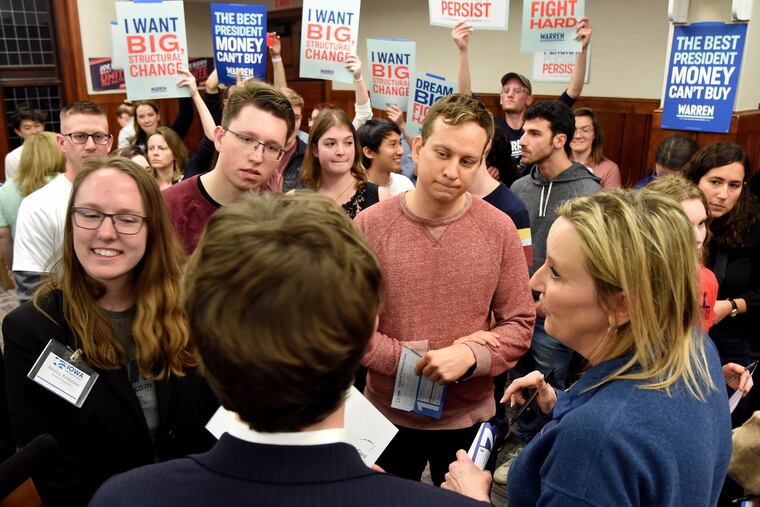There was an official Iowa caucus in Philadelphia and Bernie Sanders won
For the first time, the Iowa Democratic Party allowed out-of-state satellite caucuses. One took place at the University of Pennsylvania.

Back home in Clinton, Iowa City, Grinnell, and Johnston, their families gathered in caucus rooms under the spotlight of the entire nation.
But about 1,000 miles away in Philadelphia, they walked around a lecture room at the University of Pennsylvania to register their preferences for president of the United States.
For the first time this year, the Iowa Democratic Party allowed and registered out-of-state satellite caucuses, part of several changes to make the caucus process more inclusive. The state party approved 99 satellite caucus sites within Iowa’s borders, including several in remote areas, nursing homes, or firehouses. And 22 out-of-state satellite caucuses were approved, some as far-flung as Scotland and France.
Philadelphia’s was the lone satellite caucus in Pennsylvania, open to any Iowa Democrat who pre-registered with the party to attend.
Fourteen people showed up, mostly college students and one woman in town for business. At the end of the evening, Philadelphia’s caucus awarded their equivalent of two delegates to Vermont Sen. Bernie Sanders and one each to Massachusetts Sen. Elizabeth Warren and former Mayor Pete Buttigieg of South Bend, Ind.
As of late Monday, overall results for the Iowa Democratic caucuses — the first votes in the 2020 Democratic nominating contest after more than a year of campaigning — were still suffering from significant delays.
“Because we are the first-in-the-nation caucus, we do take our role very seriously,” said Jessica Anderson, a junior biology major at Penn, who organized the caucus. Anderson, who is from Titonka, supported entrepreneur Andrew Yang in the first round, but when Yang didn’t have enough votes to be viable, she moved over to Buttigieg.
“These settings are really precious to me, because it’s an opportunity for us to engage in civilized, hopefully very sincere, conversation with one another about what we think is important," Anderson said.
Observers and journalists, who far outnumbered participants, got a taste for how things work in Iowa. Promptly at 8 p.m. (7 p.m. Iowa time), the participants took seats in the front of a room. EJ Carlson, a Penn student who was trained by the Iowa Democratic Party, acted as chair, reading instructions aloud and passing around an envelope with a request for donations to the Iowa Democratic Party. One person gave $1. The room cheered.
Along the periphery, about a dozen Warren supporters stood by a table with Federal Donuts food. Former Vice President Joe Biden and Minnesota Sen. Amy Klobuchar also had some campaign volunteers on site.
There were a few speeches on behalf of each candidate. Then it was time to caucus.
After a first 15-minute alignment, in which people moved to the areas of the room designated for supporters of a given candidate, only Warren and Sanders had the required three supporters, or 15% of the room, required to move on.
That’s when the negotiating began. Mary Thompson, 55, who was in town for a work trip, and Matt Current, 19, a college student from Clinton, teamed up to try to get a third Buttigieg supporter. They chatted up Chris Page, a 30-year-old from Iowa City studying at the Wharton School, who was the lone Biden supporter in the first round.
Page was waffling. “To be honest, I really dislike Pete personally, but I think he’s most aligned with me politically,” he told them. Ultimately he came around, persuaded in part by Thompson’s argument that she liked Buttigieg’s immigration policies better than Warren’s.
Anderson, who caucused for Yang, moved over to Buttigieg. “They’re both young, new, and they have a real grasp of the issues," she said as Thompson and Current nodded.
Patrick Weiss, a 19-year-old at Swarthmore College who supports Sanders, tried to interject an argument about electability, saying Sanders has a better chance against President Donald Trump.
The newly formed — and now viable — Buttigieg group of four wasn’t quite buying it.
“If you want to vote for Pete, vote for Pete,” Weiss said, returning to the Sanders corner.
At the end of the evening, Sanders had six supporters, while Warren and Buttigieg each had four. Mathematically that worked out to two delegates for Sanders and one each for Buttigieg and Warren.
Weiss said he hoped it would reflect the results in Iowa.
“It’s a small sample and it’s a skewed sample — a lot of the people here are college students — but it’s kind of a representation of what young voters want,” Weiss said. “I think [Sanders] will do well, and I think that’s a very strong sign to the entire nation that he’s got what it takes to in the very least win the nomination.”
Page, alternatively, worried about a Sanders win.
“I think it’s concerning in terms of the general election and if we can actually win" with Sanders, Page said. “I’m concerned if he keeps winning, the moderate lane won’t have anywhere to go.”